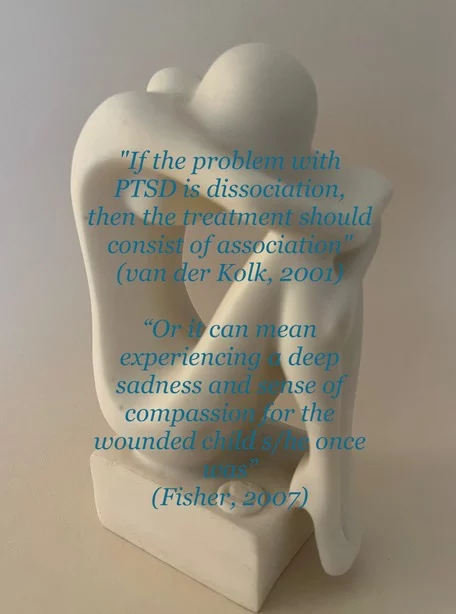
EMDR (Eye Movement Desensitization and Reprocessing)
EMDR is a powerful psychological treatment method, initially developed for PTSD. It is an evidence-based treatment endorsed by the National Institute for Health and Care Excellence (NICE) and the World Health Organisation (WHO) among other bodies.
It is specifically designed to help clients process traumatic or distressing experiences thus enabling the symptoms and emotional pain to be healed. It is based on a concept called Adaptive Information Processing (AIP) which uses bilateral stimulation in the form of eye movements or tapping to reprocess dysfunctional memories.
When an individual is traumatised, he/she may experience such strong emotions that their brain becomes overwhelmed. The brain consequently is unable to cope with, or process information as it usually does. Distressing experiences become ‘frozen in time’. Such events are stored in the brain in their original ‘raw’ form and can then be repeatedly remembered as ‘action replays’, or intrusive memories. As a consequence, the person repeatedly relives the original unpleasant event/s. Remembering in this way may feel as bad as experiencing it the first time because the images, sounds, smells, and feelings don’t change or process. Such memories have a lasting negative effect on the way a person sees themselves, the world and other people. It can have a profoundly negative effect on all aspects of their lives.
The EMDR therapist guides the client through a standardised protocol whilst using bilateral stimulation. This means the client engages a dual process by simultaneously attending to disturbing material whilst focusing on a therapist-directed external stimulus ( e.g. eye movements or tapping). Whilst the exact mechanisms are unknown, EMDR is understood to access the memory network where traumatic memories are dysfunctionally stored and enables new, adaptive associations to be made. EMDR thus aims to reduce subjective distress and strengthen adaptive beliefs related to the traumatic experience.
Whilst EMDR therapists can treat many cases of single event PTSD in 5-12 sessions, it is often more complex and may require much longer work where EMDR is combined with talking therapy over a period of months and sometimes years. So, whilst EMDR is both a powerful and effective therapeutic tool, it is not a magic wand; but even in the most complex presentations, EMDR can often provide some relief or alleviation through resourcing and other grounding techniques.
A wealth of research has been conducted demonstrating the benefits of EMDR therapy in treating psychological trauma arising from experiences as diverse as war related experiences, childhood abuse or neglect, natural disaster, assault, road traffic accidents and workplace accidents.
Finally, whilst EMDR was initially developed in 1989 to treat PTSD, it is now used to treat a range of conditions including depression, anxiety, phobias, OCD, attachment disorders, chronic pain, acute stress and more. The EMDR field is full of therapists applying this ground-breaking technique to an ever-wider range of presentations with exciting and encouraging results
Post Traumatic Stress Disorder (PTSD)
PTSD is a term which first came into usage in the 1970’s to describe the psychological issues affecting US soldiers returning from the Vietnam War. It was officially recognised as a disorder in 1980 by the American Psychiatric Association. Trauma, of course, has long been acknowledged as having a significant impact on the human psyche. The term PTSD acknowledges this impact, particularly the neurobiological changes to both the central and autonomic nervous system, and the detrimental effects these changes have on human behaviour and functioning.
If you have been diagnosed with PTSD or are suffering from PTSD-like symptoms, as a result of a traumatic or distressing experience, your daily life is probably very challenging. You may be noticing any of the following symptoms:
- nightmares
- flashbacks
- intrusive thoughts
- hypervigilance
- avoidance of places or things which remind you of the event
- feeling numb or detached

- memory lapses around the event
- loss of interest in life
- low mood or negative thoughts
- anger and irritability
- panic attacks.
Please see below for a list of references and websites which you can peruse for more information.
https://www.emdrworks.org
Trauma and Recovery by Judith Herman
The Body Keeps the Score by Bessel van der Kolk
The Body Remembers: The Psychophysiology of Trauma and Trauma Treatment by Babette Rothschild
Eye Movement Desensitization and Reprocessing (EMDR) Therapy by Francine Shapiro
Attachment-Focused EMDR: Healing Relational Trauma by Laurel Parnell
EMDR Toolbox: Theory and Treatment of Complex PTSD and Dissociation by Jim Knipe
Waking the Tiger: Healing Trauma by Peter Levine
Healing The Fragmented Selves of Trauma Survivors by Janina Fisher
© Louise Squires Psychotherapy
powered by WebHealer
